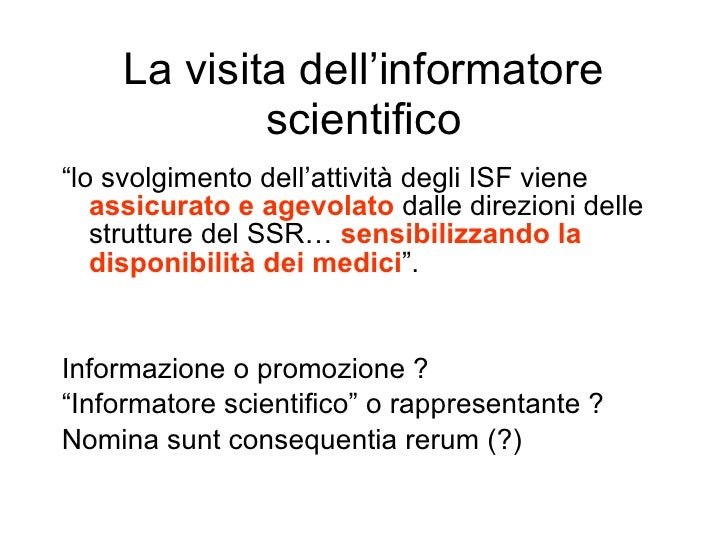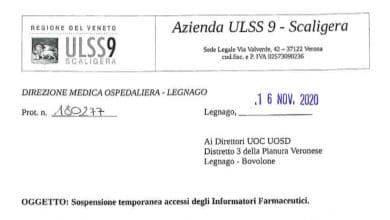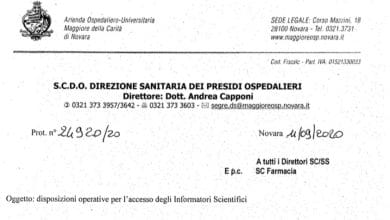
The recent «Conference: “Scientific Representative Management LOW PERFORMER”», organized by Lupi & Associati, is based on the premise of the commercial nature of the ISF. After all, it cannot be otherwise given that they want to acquire hefty remunerations from the companies that use their consultancy. This conference deals with the theme of how to "re-educate" the ISF that "does not sell"
 In support of this thesis, the illustrious professionals argue that the opinion that the ISF has the right to be evaluated only on the basis of its professional classification and profile (and therefore only with reference to the quality of the scientific information service), and not on the basis market performance is not very consistent with the regulatory framework governing the figure of the ISF. According to them, from the careful analysis of the law (Legislative Decree 219/06) it emerges that if it is true that scientific information must favor the rational use of the medicinal product, it is equally true that it is intended above all to promote the prescription, sale and consumption of the same. Confirmation also comes from the Chemical-Pharmaceutical CCNL which, in defining the reference professional figures, notoriously places the scientific representatives reporting directly to the marketing/commercial/sales functional area in the person of the Area manager who, by definition, has the task to ensure the achievement of sales targets.
In support of this thesis, the illustrious professionals argue that the opinion that the ISF has the right to be evaluated only on the basis of its professional classification and profile (and therefore only with reference to the quality of the scientific information service), and not on the basis market performance is not very consistent with the regulatory framework governing the figure of the ISF. According to them, from the careful analysis of the law (Legislative Decree 219/06) it emerges that if it is true that scientific information must favor the rational use of the medicinal product, it is equally true that it is intended above all to promote the prescription, sale and consumption of the same. Confirmation also comes from the Chemical-Pharmaceutical CCNL which, in defining the reference professional figures, notoriously places the scientific representatives reporting directly to the marketing/commercial/sales functional area in the person of the Area manager who, by definition, has the task to ensure the achievement of sales targets.
It is true that the activity of the ISF is included in Title VIII of Legislative Decree 219/06 which concerns advertising, but the distinguished professionals only mention what is convenient for them and what they want to demonstrate. The art. 114, for example, indicates the parts of scientific information that are regulated. And the same art. 114 indicates that "all elements of the advertising of a medicinal product must comply with the information contained in the summary of product characteristics”
The art. 119 states that "scientific information to healthcare professionals must be carried out in compliance with the criteria and guidelines adopted by AIFA, subject to agreement with the Permanent Conference for relations between the State, the regions and the autonomous provinces of Trento and Bolzano”.
 Directly then is theart. 122 which states "Scientific reps must report to the scientific service referred to in Article 126, on which they depend, and to the head of the pharmacovigilance service referred to in paragraph 4 of article 130, all information on the undesirable effects of medicines. The companies holding marketing authorization ensure the constant updating of the technical and scientific training of scientific representatives”. The law certainly does not speak of sales or marketing techniques as in the CCNL it is envisaged for technical/scientific training or for the Product Manager (PM) who coordinates the implementation of advertising and promotional initiatives to the external network (ISF).
Directly then is theart. 122 which states "Scientific reps must report to the scientific service referred to in Article 126, on which they depend, and to the head of the pharmacovigilance service referred to in paragraph 4 of article 130, all information on the undesirable effects of medicines. The companies holding marketing authorization ensure the constant updating of the technical and scientific training of scientific representatives”. The law certainly does not speak of sales or marketing techniques as in the CCNL it is envisaged for technical/scientific training or for the Product Manager (PM) who coordinates the implementation of advertising and promotional initiatives to the external network (ISF).
To the art. 123 it is also said that “it is forbidden to grant, offer or promise prizes, pecuniary advantages or in kind, unless they are of negligible value”.
L'art. 126 points out that "Every company that holds the marketing authorization for medicines must be equipped with a scientific service responsible for information on medicinal products which it places on the market. The Scientific Service must be independent from the Marketing Service of the pharmaceutical company and verifies that the scientific representatives employed by them are in possession of adequate training and comply with the obligations imposed by this decree”. There doesn't seem to be any doubt about it.
The illustrious biased lawyers then forget the AIFA opinion expressed by the former Director Martini or the judgment of the Supreme Court (which makes case law), Labor Section - sentence 15 September 2014 n. 19394 - which states that the ISF is not a commercial agent and that the "sales promotion" is excluded for the ISF and whose activity "is not that of promoting contracts", albeit indirectly.
Therefore it is true that scientific information is included in Legislative Decree 219 in the title which concerns advertising, but precisely to specify its limits and bring it back to its original meaning, i.e. to make known to the public (in our case, to those who prescribe and dispense medicines ), essentially to prohibit sales promotion. And it is equally true that the scientific rep in the CCNL is included in the functional area of marketing, but it is a clear error of the CCNL given that the law, which has more value than a contract, categorically and clearly excludes the ISF from marketing, so much so that almost all regional regulations exclude and forbid a marketing officer, such as an area manager, to work alongside the ISF.
 The unions themselves are beginning to understand the tragic error of the CCNL which, probably believing it was increasing recruitment, instead caused 15,000 dismissals of FSI to rehire a few thousand FSI as commercial agents or in any case with commercial contracts. The recent inclusion of the ISF as a probable corruptor in the ANAC anti-corruption code and the recent penalizing and aberrant access regulations in the hospitals of Emilia-Romagna all derive from these distortions.
The unions themselves are beginning to understand the tragic error of the CCNL which, probably believing it was increasing recruitment, instead caused 15,000 dismissals of FSI to rehire a few thousand FSI as commercial agents or in any case with commercial contracts. The recent inclusion of the ISF as a probable corruptor in the ANAC anti-corruption code and the recent penalizing and aberrant access regulations in the hospitals of Emilia-Romagna all derive from these distortions.
The real nature of the ISF, therefore, is scientific, he is precisely a scientific informant, as required by the DL 30.12.1992 n. 541 and the subsequent Legislative Decree 219/06 which incorporated it.
Then, lacking controls, the companies do what they want, until they are sued.
The introduction of the so-called "Jobs Act" does not help. The "commercial" pressure on the ISF during the sale can be insistent and coercive. Private investigators can be hired to follow up on the employee and syndicate his every working minute; company cars are equipped with geolocation devices that give the car's position 24 hours a day; iPhone and iPad, now very common business tools, are constantly geolocated. The demotion and transfer for "low performance" (as they call it) are normal "human resources" management tools... And above all, the dismissal finally without rules, without humanity, without economic or legal protection.
How to get out of the mess and the illegality caused by such a CCNL? One way could be an amnesty that photographs the current state that safeguards existing job positions and does not penalize anyone. The new figures who operate and are not duly considered, such as the KAM or the MSL, must be included in the new CCNL. At the same time it is necessary, from now on, to implement the law with the appropriate controls, those who have prescription drugs will necessarily have to be classified according to the law, otherwise the ISF is doomed to extinction.
It's a proposition, of course. There may be others that are just as good. It will be appropriate to open a frank debate to share a shared position to bring to the negotiation table for the renewal of the CCNL.
Editorial staff – 10/07/2017
Related news: Observations of a UILTEC Colleague at the Milan conference on ISF
Nota: L’informazione sui medicinali da prescrizione non può essere pubblicità ma informazione. Riporto alcuni stralci di una sentenza della Corte di Giustizia Europea nella causa C‑530/20 del 22 dicembre 2022.
Art. 113 del D.Lgs 219/06 (attuazione dell’art. 86 della Direttiva Europea)
L’articolo 86, paragrafo 1, della direttiva 2001/83 (Art. 113 D.Lgs.219/06) dice che la nozione di «pubblicità dei medicinali», ai sensi di tale disposizione, comprende qualsiasi azione d’informazione, di ricerca della clientela o di incitamento, intesa a promuovere la prescrizione, la fornitura, la vendita o il consumo di un determinato medicinale o di medicinali indeterminati.
Dal dettato dell’articolo 86, paragrafo 1, della direttiva 2001/83 risulta che la finalità del messaggio costituisce la caratteristica essenziale della nozione di «pubblicità dei medicinali» ai sensi di tale disposizione, e l’elemento determinante per distinguere la pubblicità dalla mera informazione. Laddove il messaggio sia inteso a promuovere la prescrizione, la fornitura, la vendita o il consumo di medicinali, si tratta di pubblicità ai sensi di tale direttiva. Al contrario, un’indicazione meramente informativa senza intenti promozionali non rientra nelle disposizioni di detta direttiva relative alla pubblicità dei medicinali (sentenza del 5 maggio 2011, MSD Sharp & Dohme, C‑316/09, EU:C:2011:275, punti 31 e 32).
Le finalità perseguite dalla direttiva 2001/83, risulta che essa ha come obiettivo essenziale quello di assicurare la tutela della sanità pubblica.
La Corte ha già avuto modo di dichiarare che la pubblicità dei medicinali può nuocere alla salute pubblica. Occorre infatti sottolineare il carattere del tutto particolare dei medicinali, che si distinguono sostanzialmente dalle altre merci per via dei loro effetti terapeutici.
Orbene, l’obiettivo essenziale di assicurare la tutela della sanità pubblica sarebbe in larga parte compromesso se l’articolo 86, paragrafo 1, della direttiva 2001/83 fosse interpretato nel senso che un’azione di informazione, di ricerca della clientela o di incitamento, intesa a promuovere la prescrizione, la fornitura, la vendita o il consumo di medicinali senza fare riferimento a un determinato medicinale non rientri nella nozione di «pubblicità dei medicinali», ai sensi di tale disposizione, e non sia, pertanto, soggetta ai divieti, alle condizioni e alle restrizioni previste da tale direttiva in materia di pubblicità.





